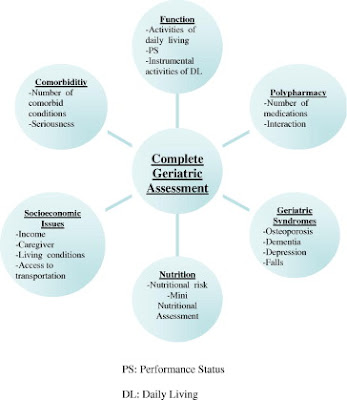Geriatric Nursing is responsible for specialized care
for sick or the institutionalized elderly.
Nurses have a very important role in this stage of
life of the people because they are responsible among other things for the
process of care, disease prevention and aid in the process of dying.
The nurse is responsible for the following functions:
Care, management, teaching and research.
It is very important to know the different types of
elderly people in relation to guiding clinical profiles.
- Healthy elderly: age and absence of disease, they
are independent in their activities of daily living and basic activities. They
have a low tendency for dependence.
- Frail Elderly: elderly patients that have some
disease or other condition that remains balanced and with a high risk of
becoming dependent. They are dependent for some of the instrumental activities
of daily living, and dependent for basic activities of daily living. They are high
tendency to dependence.
- Geriatric patient: elderly patient with one
or more chronic diseases that need a lot of help.
Normally they are connected with a mental disorder or
a social problem.
This patient is dependent one or more basic activities
of daily living and for one or more instrumental activities of daily living.
National and International statistics show that health
teams will have to respond to the needs of caring for older people, considering
the implication of the functional capacity as a variable of evaluation of their
health condition.(1)
In my opinion, geriatric nursing is very important in
our work because ageing is a process which all the people support.
We should prevent problems that could occur, so that
elderly people get the best possible
quality of life.
"The glory of young men is their strength, the
beauty of the elderly is their old age."
Proverbs of Solomon
BIBLIOGRAFIA



















